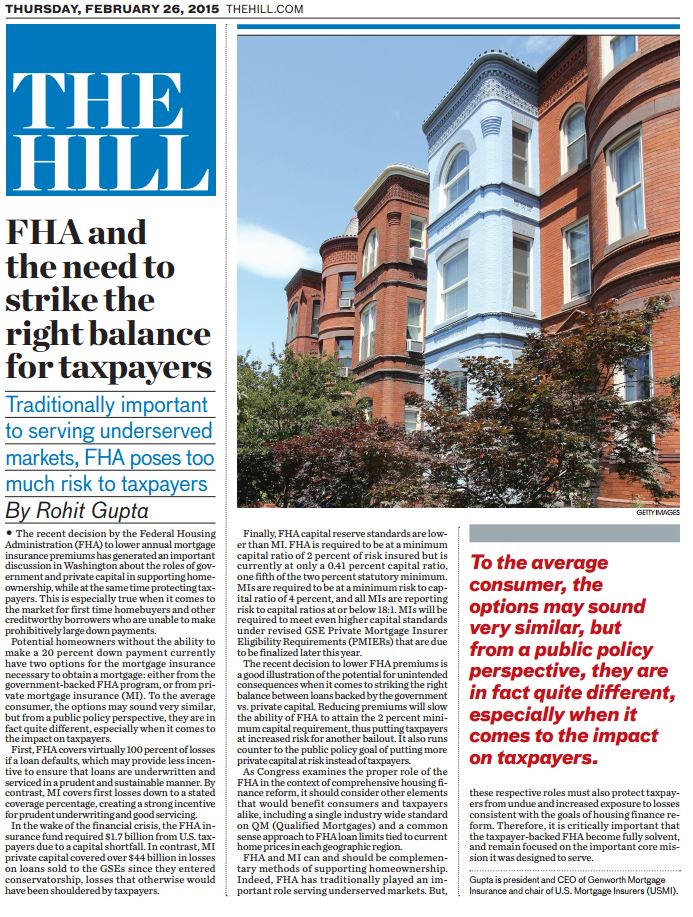For Immediate Release
March 31, 2015
Media Contacts
Robert Schwartz 202-207-3665 (rschwartz@prismpublicaffairs.com)
Michael Timberlake 202-207-3637 (mtimberlake@prismpublicaffairs.com)
USMI Responds to Basel Committee Credit Risk Proposal
U.S. Mortgage Insurers (USMI) submitted a response to the Basel Committee on Banking Supervision’s proposal, Revisions to the Standardised Approach for credit risk, which would, among other things, revise the calculation of banks’ risk weights for exposures secured by residential real estate under the Standardized Approach for calculating credit risk under the Basel capital framework.
USMI raised two primary areas of concern with the proposal: it does not appear to recognize the risk-reducing effect of private mortgage insurance in the calculation of residential mortgage risk weights, nor does it appear to recognize the risk-increasing effect of simultaneous second lien mortgages on primary residential mortgage exposures.
To address these concerns, USMI urged the Basel Committee to recognize the risk-reducing effect of mortgage insurance in the calculation of residential mortgage risk weights, pointing out several key benefits of mortgage insurance:
- Mortgage insurance plainly reduces the risk of a residential mortgage. Mortgage insurers leverage their credit expertise and analytics to extend insurance only on those mortgage loans they believe are soundly underwritten, providing an important third party check on mortgage underwriting practices. For example, in the U.S., private mortgage insurance has covered over $44 billion in claims to Fannie Mae and Freddie Mac (the “GSEs”) for such losses since the GSEs entered conservatorship, losses that otherwise would have been borne by taxpayers.
- Mortgage insurers are subject to considerable prudential regulation and oversight designed to ensure that they can pay claims when due. In the U.S., for example, private mortgage insurers are subject to a robust state-by-state regulatory regime. This regime will be complemented by the publication by the Federal Housing Finance Agency of the final revisions to the comprehensive private mortgage insurer eligibility requirements (“PMIERs”) later this year. When finalized and implemented, the PMIERs will be a unified and transparent set of risk management, operational risk, and regulatory compliance requirements applicable to all mortgage insurers seeking to do business with the GSEs.
- Recognizing the risk-reducing effect of mortgage insurance in the calibration of risk-weights in the Proposal would be consistent with the risk weighting approaches adopted by several Basel Committee member countries.
- Failure to recognize the risk-reducing effect of mortgage insurance would result in more expensive mortgages, tighter mortgage credit, and less low down payment lending supported by mortgage insurance. By ignoring the beneficial effect of mortgage insurance, the proposal would require banks to hold more capital against higher loan-to-value (LTV) loans with MI than would be warranted by the actual risk.
Additionally, USMI urged the Committee to use a combined loan-to-value ratio that gives effect to simultaneous second liens for residential mortgage risk weighting, rather than the first lien loan-to-value ratio. As written, the proposal ignores the significant risks inherent in loans with junior second liens originated at the same time on the same residence as the primary mortgage, also known as “simultaneous seconds” readily observed during the financial crisis.
###
U.S. Mortgage Insurers (USMI) is dedicated to a housing finance system backed by private capital that enables access to housing finance for borrowers while protecting taxpayers. Mortgage insurance offers an effective way to make mortgage credit available to more people. USMI is ready to help build the future of homeownership. Learn more at www.usmi.org.











